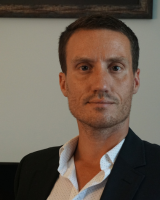In January 2022, the Stem Cell Network (SCN) and Mitacs partnered to offer industry-based internships in the regenerative medicine (RM) sector, successfully placing four interns within the first year of the program. Now in its second year, SCN is pleased to announce that six applicants were successful and are now interning with RM-focused biotech companies that are moving innovative therapies and technologies into the marketplace. SCN had the opportunity to speak with the successful interns about their career paths, internship projects and future career goals.
 Jack Hickmott, Post-doctoral Fellow, University of Toronto
Jack Hickmott, Post-doctoral Fellow, University of Toronto
Company Match: Virano Therapeutics
In 2012, Jack started his PhD in the Simpson Lab at the University of British Columbia working on a gene therapy for aniridia, a rare genetic eye disorder. One of his major research contributions was the development of “promoters” to direct the expression of genes in specific tissues of interest. In 2018, he began a post-doctoral fellowship in the Gene Therapy Group at Imperial College London, UK, where he worked on a gene therapy for alpha-1 antitrypsin deficiency, inventing two technologies for which he filed patents. These patents are now being commercialized into a newly founded biotechnology company.
In 2022, Jack joined the Morshead Lab at the University of Toronto. His post-doctoral fellowship focuses on regulating the neuroinflammatory response following brain injury and reprogramming neural cells to generate new neurons and promote stroke recovery.
“My academic career has focused on translating research into novel therapies and technologies,” said Jack. “A crucial part of my training as a post-doc will be learning how to work with industry to transform academic research into products and therapeutics that improve patient health.”
Jack is interning at Virano Therapeutics where he will be directly exposed to strategies and tactics required to grow a biotechnology business in cell and gene therapy. Virano Therapeutics is a Toronto-headquartered start-up currently in stealth mode with a vision to bring vastly improved and safer gene therapies to patients. His work will focus on learning pre-clinical experimental design and data analysis for translational research, research and development budget management, scientific communications, and intellectual property generation and management. With the goal of translation, he will start his internship with primary cell culture assays, using the results to inform the design of follow-up mouse studies. Throughout his internship, Jack will directly test Virano’s technology in the central nervous system. Such technologies could be useful for developing gene therapies for the central nervous system to treat brain injuries and neural degenerative disorders.
“At Virano, I hope to learn more about how research is turned into marketable products, how to position my research so it is attractive and useful to industry, and make industry connections that can turn into long-term partnerships,” said Jack. “The SCN-Mitacs internship program is allowing me to gain the necessary expertise to pursue my passions. I will receive mentorship from senior leaders at Virano, enabling me to become a better scientist as I work towards turning research ideas into valuable tools and therapeutics for the public.”
After completing his post-doctoral fellowship, Jack hopes to establish the Hickmott Lab for Advanced Therapeutics at a major Canadian university. His vision includes partnering with industry and spinning out start-up companies, with the ultimate goal of developing new therapeutics and technologies that solve some of today’s challenges with cell and gene therapies.
 Kathryn Jalink, Master’s Student, Queen’s University
Kathryn Jalink, Master’s Student, Queen’s University
Company Match: Morphocell Technologies
During high school, Kathryn volunteered at Kingston General Hospital where she gained an appreciation for the role that science and medicine play in treating patients and transforming their lives. She witnessed the direct impact biomedical engineering had on improving patient health outcomes. This led Kathryn to complete a degree in Engineering Chemistry and a Certificate in Business, gaining the technical skills and know-how of bringing a product to market. Kathryn is now completing a master’s degree in Applied Science and Chemical Engineering at Queen’s University.
“My graduate program experience has proved to me that I have a passion for research and the development of new technologies,” said Kathryn. “My current project focuses on developing novel collagen-based materials to support lens regeneration to treat congenital cataracts. Aside from gaining technical skills, this program has allowed me to become a detail-oriented thinker and independent problem solver.”
Kathryn is interning at Morphocell Technologies where she will be exposed to the research and development (R&D) of a regenerative medicine company focused on developing and commercializing cell therapies and engineered tissues aimed at treating severe organ deficiencies, including liver disease. She will gain skills across the R&D spectrum, including data collection and reporting, tissue engineering, and regulatory requirements. Kathryn’s project will focus on the optimization of biomaterial fabrication as part of Morphocell’s engineered tissue platform.
“Biomedical engineering solutions have the potential to drastically improve the patient experience,” said Kathryn. “The SCN-Mitacs internship will allow me to further develop my research skills, learn new techniques that will improve the quality of my research, and help build my network of industry experts, as I work towards developing novel therapies and technologies in the future.”
Kathryn aspires to have a career in the industry of regenerative medicine and tissue engineering to develop novel biomaterials and drug delivery models. This combines her passions for problem-solving and healthcare to help solve some of today’s most pressing medical challenges. This career path will allow her to develop innovative solutions that will go from ideation to a marketable product that will change the lives of patients.
 Behnam Panahi, PhD Student, University of British Columbia
Behnam Panahi, PhD Student, University of British Columbia
Company Match: Axolotl Biosciences
Behnam was among the top 10% of students in the BSC Chemical Engineering program at the Sharif University of Technology, Iran’s leading technology institute. After ranking 2nd among more than 10,000 participants in the MSc Biomedical Engineering Entrance Exam, he decided to pursue a master’s degree in this field. In 2022, Behnam was admitted to the highly competitive NSERC CREATE program as a PhD student in 3D printing technology and materials (3DPTM) at the University of British Columbia under the supervision of Drs. Nozomu Yachie and Glen Tibbits.
“As a 3DPTM trainee, I have had the opportunity to develop my professional skills, gain hands-on experience with cutting-edge equipment relevant to 3D printing and software relevant to tissue engineering, and establish valuable connections with industry professionals,” said Behnam. “I have also had the privilege of gaining leadership experience through mentoring and training other students, which led to my appointment as lab manager. I believe all these experiences will allow me to make a seamless transition into the workforce upon completion of this program.”
Behnam is interning at Axolotl Biosciences. Axolotl’s mission is to deliver innovative products that enable 3D bioprinting of humanized tissue models for advancing medicine. His project will involve optimizing Axolotl’s bioink for 3D printing cardiac tissue. He will gain skills related to quality control, stability testing, and 3D bioprinting, and work closely with the business development team to learn about marketing, project management and gain further business skills.
“I believe that innovation is at the heart of academia, however, historically, commercial translation of this intellectual property has been weak”, said Behnam. “As a passionate biomedical engineer, the SCN-Mitacs internship is providing me the opportunity to advance my knowledge and skills in the field, and provide me with a better understanding of research, hopefully allowing me to bridge the gap between academia and commercial applications in the future.”
Behnam’s goal is to become an accomplished academic and industry professional who conducts research and contributes to mentoring successful employees. He hopes to revolutionize regenerative medicine through the innovative use of stem cells and 3D printing, ultimately reshaping the future of the healthcare industry.
 Morgan Robinson, PhD Graduate, University of Waterloo
Morgan Robinson, PhD Graduate, University of Waterloo
Company Match: Mediphage
Morgan’s passion for science has been propelled by his personal health experiences – he was born with cystic fibrosis (CF), a rare genetic disease that primary affects the lungs and digestive system. Although he originally sought out to find a cure for CF, Morgan’s curiosity about the nature of the universe and the human mind led him to complete a degree in Physics and Biophysics, an MSc in Biology, and PhD in Pharmaceutical Sciences. Morgan’s areas of expertise span neuroscience, cell signaling, lipid structure, metabolism and properties, aging, Alzheimer’s disease, protein misfolding, and drug development.
“My lungs have undergone significant degeneration as a result of cystic fibrosis, and I am tired of having pancreatic insufficiency,” said Morgan. “It is my aim to clone genetically modified new lungs and a new pancreas from my own stem cells, safely, for transplantation so that I might live a normal length of life and have a family. Even though it’s unlikely that all the challenges associated with cloning lungs for transplantation will be solved in my lifetime, I am pursuing this goal so others may benefit from this technology in the future.”
Morgan is interning at Mediphage Bioceuticals, a spin off from the University of Waterloo. Mediphage is a non-viral gene therapy company, developing innovative solutions to the challenges faced with genetic and infectious diseases that have limited, or no, treatment options available at present. Morgan will work directly with highly skilled senior scientists, gaining technical skills such as industrial upstream and downstream manufacturing, gene editing, transfection, analytical assays, and many more molecular and cell biology techniques. Morgan will also develop business skills including project management, critical thinking, business writing and communications, technical writing and presenting, and data analysis.
“As I have gotten older, I have come to realize the profound importance of health and well-being,” said Morgan. “For my career I strive to work on ground-breaking and disruptive technologies that will further human health. Stem cell technologies and genetic engineering, I believe, hold the most promise in this area first by improving our understanding of human physiology and disease mechanisms and, second, to deliver cell-based therapeutics and patient-specific organs for transplantation. Through this internship, I hope to gain further skills and expertise that will allow me to build a healthier and happier future.”
Morgan’s long-term career goal is to establish a biotechnology company that will produce organ models for research that can be used to determine disease risk factors and optimize drug prescribing and dosing for patients. He ultimately hopes to one day produce patient-specific organs for transplantation.
 Nazanin Vaziri, PhD Student, University of Calgary
Nazanin Vaziri, PhD Student, University of Calgary
Company Match: Mesintel Therapeutics
Nazanin is a fourth year PhD student in medical sciences at the University of Calgary. She has a broad background in cellular and molecular biology, with specific training in medical genetics and stem cells. Her PhD project focuses on understanding how certain medications used to treat mental health conditions can harm the heart. Specifically, she’s trying to figure out why antipsychotic drugs can cause inflammation and damage to the heart muscles.
“My research uses special cells, called induced pluripotent stem cells or iPSCs, created from people with treatment-resistant schizophrenia,” said Nazanin. “The iPSCs are then programmed to become heart muscle cells, or cardiomyocytes. Using this disease model, I can test current and new antipsychotic drugs to identify possible new therapies to prevent or treat heart inflammation.”
Nazanin is interning at Mesintel Therapeutics, a Vancouver-based biotechnology company. Mesintel has developed a proprietary target discovery platform based on fibroblast biology to accelerate the development of therapeutics in areas of high unmet medical need, including cancer and fibrosis. Nazanin’s project will focus on identifying potential drug candidates that modify fibroblast activity and determine whether these candidates could be patented for medical purposes. The internship will hone Nazanin’s experimental skills and provide her with training in how targets and drug candidates are vetted and prioritized for further development towards clinical use.
“I am excited about the opportunity to use my technical skills and scientific knowledge to optimize manufacturing processes and improve efficiencies at Mesintel Therapeutics,” said Nazanin. “The SCN-Mitacs internship is providing me the unique opportunity to gain insights into the fast-paced biotechnology research environment”.
Nazanin looks forward to expanding her network throughout the course of the internship and to acquiring further business and leadership skills. Her long-term career goal is to become a successful scientist, working for large biotechnology, pharmaceutical or regenerative medicine companies.
 Yuxi Zhang, PhD Student, Queen’s University
Yuxi Zhang, PhD Student, Queen’s University
Company Match: Octane EXO Inc.
Yuxi holds a BSc in Material Science and Engineering, an MASc in Mechanical Engineering, and is currently a third-year PhD candidate in Chemical Engineering in Dr. Lindsay Fitzpatrick’s lab at Queen’s University. Yuxi has a broad background in material sciences, with specific training and expertise in cell culture (2D and 3D), activation of pattern recognition pathways in inflammation, immune assays, and fluorescent microscopy. She has traveled to, and presented, at conferences across Canada and is a member of both the Science2Business Society and Canadian Biomaterials Society.
“My thesis project focuses on lengthening the wear time of infusion sets that are used to deliver insulin from insulin pumps for the treatment of type 1 diabetes, which usually develops in children and young adults,” said Yuxi. “The mechanisms underlying the body’s response to these devices has not been investigated and my hope is to identify strategies for increasing the wear time of infusion sets past three days to reduce the financial burden and inconvenience this brings to patients.”
Yuxi is interning at Octane, a Kingston-based biotechnology company focused on regenerative medicine. Octane EXO has developed a proprietary bioactive spinal implant with active remodeling capacity. During this placement, Yuxi will enhance skills related to biology, chemistry, and engineering by assessing the inflammatory response of Octane’s implant material using cell models.
“The SCN-Mitacs internship is providing me the unique opportunity to gain technical expertise in an industrial research environment”, said Yuxi. “I will receive mentorship from senior leaders at Octane that will enable me to become a better scientist, leader, and mentor.”
Yuxi aspires to become a senior scientist, and eventually an executive, at a biotechnology company to play a critical role in the growth of the company and the development of novel drug screening models, biomedical devices, and therapeutics.

